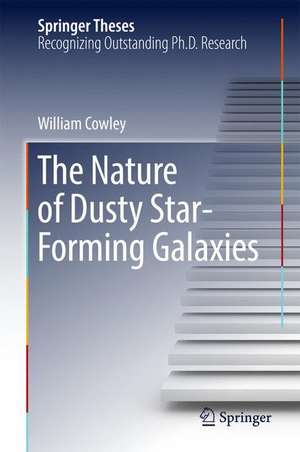The Nature of Dusty Star-Forming Galaxies: Springer Theses
Autor William Cowleyen Limba Engleză Hardback – 11 oct 2017
| Toate formatele și edițiile | Preț | Express |
|---|---|---|
| Paperback (1) | 552.44 lei 39-44 zile | |
| Springer International Publishing – 25 aug 2018 | 552.44 lei 39-44 zile | |
| Hardback (1) | 643.48 lei 6-8 săpt. | |
| Springer International Publishing – 11 oct 2017 | 643.48 lei 6-8 săpt. |
Din seria Springer Theses
- 18%
 Preț: 997.88 lei
Preț: 997.88 lei -
 Preț: 389.88 lei
Preț: 389.88 lei - 15%
 Preț: 646.94 lei
Preț: 646.94 lei - 18%
 Preț: 943.43 lei
Preț: 943.43 lei -
 Preț: 399.29 lei
Preț: 399.29 lei - 18%
 Preț: 944.99 lei
Preț: 944.99 lei - 15%
 Preț: 636.80 lei
Preț: 636.80 lei - 18%
 Preț: 941.05 lei
Preț: 941.05 lei - 15%
 Preț: 643.16 lei
Preț: 643.16 lei - 15%
 Preț: 642.68 lei
Preț: 642.68 lei - 18%
 Preț: 1103.62 lei
Preț: 1103.62 lei - 20%
 Preț: 558.82 lei
Preț: 558.82 lei - 18%
 Preț: 1112.30 lei
Preț: 1112.30 lei - 18%
 Preț: 944.19 lei
Preț: 944.19 lei - 18%
 Preț: 1109.92 lei
Preț: 1109.92 lei - 18%
 Preț: 1217.27 lei
Preț: 1217.27 lei - 15%
 Preț: 640.06 lei
Preț: 640.06 lei - 15%
 Preț: 636.45 lei
Preț: 636.45 lei - 15%
 Preț: 640.06 lei
Preț: 640.06 lei - 15%
 Preț: 640.88 lei
Preț: 640.88 lei -
 Preț: 389.70 lei
Preț: 389.70 lei - 20%
 Preț: 563.89 lei
Preț: 563.89 lei -
 Preț: 393.35 lei
Preț: 393.35 lei - 15%
 Preț: 637.93 lei
Preț: 637.93 lei - 15%
 Preț: 641.85 lei
Preț: 641.85 lei - 18%
 Preț: 1225.94 lei
Preț: 1225.94 lei - 20%
 Preț: 551.36 lei
Preț: 551.36 lei - 18%
 Preț: 1229.10 lei
Preț: 1229.10 lei - 15%
 Preț: 639.25 lei
Preț: 639.25 lei - 18%
 Preț: 999.45 lei
Preț: 999.45 lei - 15%
 Preț: 640.06 lei
Preț: 640.06 lei - 18%
 Preț: 1220.45 lei
Preț: 1220.45 lei - 18%
 Preț: 1116.26 lei
Preț: 1116.26 lei - 18%
 Preț: 1110.72 lei
Preț: 1110.72 lei - 18%
 Preț: 1000.87 lei
Preț: 1000.87 lei - 18%
 Preț: 891.17 lei
Preț: 891.17 lei - 15%
 Preț: 640.06 lei
Preț: 640.06 lei - 5%
 Preț: 1154.07 lei
Preț: 1154.07 lei - 15%
 Preț: 635.96 lei
Preț: 635.96 lei - 15%
 Preț: 640.88 lei
Preț: 640.88 lei -
 Preț: 387.20 lei
Preț: 387.20 lei - 18%
 Preț: 1109.92 lei
Preț: 1109.92 lei -
 Preț: 385.25 lei
Preț: 385.25 lei -
 Preț: 385.25 lei
Preț: 385.25 lei - 18%
 Preț: 1112.30 lei
Preț: 1112.30 lei - 18%
 Preț: 999.45 lei
Preț: 999.45 lei -
 Preț: 386.99 lei
Preț: 386.99 lei - 15%
 Preț: 637.13 lei
Preț: 637.13 lei - 20%
 Preț: 554.20 lei
Preț: 554.20 lei - 20%
 Preț: 555.57 lei
Preț: 555.57 lei
Preț: 643.48 lei
Preț vechi: 757.04 lei
-15% Nou
Puncte Express: 965
Preț estimativ în valută:
123.14€ • 128.40$ • 102.34£
123.14€ • 128.40$ • 102.34£
Carte tipărită la comandă
Livrare economică 20 martie-03 aprilie
Preluare comenzi: 021 569.72.76
Specificații
ISBN-13: 9783319667478
ISBN-10: 3319667475
Pagini: 196
Ilustrații: XXXV, 196 p. 74 illus., 57 illus. in color.
Dimensiuni: 155 x 235 mm
Greutate: 0.5 kg
Ediția:1st ed. 2017
Editura: Springer International Publishing
Colecția Springer
Seria Springer Theses
Locul publicării:Cham, Switzerland
ISBN-10: 3319667475
Pagini: 196
Ilustrații: XXXV, 196 p. 74 illus., 57 illus. in color.
Dimensiuni: 155 x 235 mm
Greutate: 0.5 kg
Ediția:1st ed. 2017
Editura: Springer International Publishing
Colecția Springer
Seria Springer Theses
Locul publicării:Cham, Switzerland
Cuprins
Introduction.- The Galaxy Formation Model.- Simulated Observations of Sub-millimetre Galaxies: The Impact of Single-dish Resolution and Field Variance.- The Clustering Evolution of Dusty Star-Forming Galaxies.- The Far Infra-red Seds of Main-sequence and Starburst Galaxies.- Predictions for Deep Galaxy Surveys with JWST.- Overall Conclusions and Future Work.
Notă biografică
Dr. William Cowley is a British scientist originally from Middlesbrough. He completed his Masters degree in theoretical physics in 2010 at Imperial College London, before spending two years as a consultant for Ernst & Young, working mainly in financial risk. He returned to academia in 2012 to begin his PhD at the Institute for Computational Cosmology, Durham University, where he was supervised by Profs. Cedric Lacey, Carlton Baugh and Shaun Cole. He successfully defended his thesis in November 2016 and is now a post-doctoral researcher at the Kapteyn Astronomical Institute, University of Groningen, working with Prof. Dr. Karina Caputi.
Textul de pe ultima copertă
This thesis combines a theoretical model of galaxy formation with a treatment of the radiative transfer in the titular dusty star-forming galaxies. Embedding this within the well-established ΛCDM (Lambda cold dark matter) cosmology, the author was able to simulate galaxy populations from which realistic observational images were synthesised. Based on further analysis, he shows that there is a good correspondence with observations from new instruments such as the SCUBA2 bolometric camera and the Atacama Large Millimeter Array (ALMA) interferometer, and reveals some novel aspects of this exciting galaxy population. In particular, he shows that blending of these galaxies in the imaging produces an artificial enhancement in their clustering, which he dubs “blending bias”. This implies that the host dark matter halo masses for these galaxies have previously been significantly overestimated. He also presents amongst the first predictions from a galaxy formation model for observations of these galaxies that will be made by the James Webb Space Telescope (the successor to the Hubble Space Telescope).
Caracteristici
Nominated as an outstanding Ph.D. thesis by the Durham University, UK Includes a novel analytical derivation of the “blending bias” effect Is among the first predictions from a galaxy formation model for the James Webb Space Telescope Explains novel coupling of galaxy formation and radiative transfer models Includes supplementary material: sn.pub/extras
